-
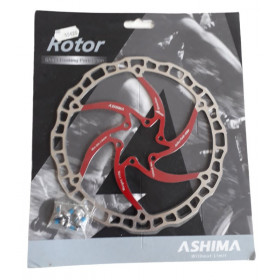 New product -47%180 disc brake 6 holes Ashima ARO 08 red
New product -47%180 disc brake 6 holes Ashima ARO 08 red- €15.37
- €29.00
-
 New product UsedCenterlock disc Shimano SM-RT62
New product UsedCenterlock disc Shimano SM-RT62- €7.99
-
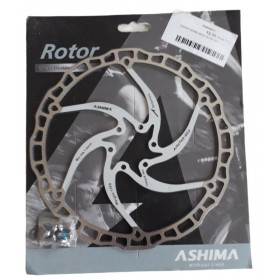 New product -20%203 disc brake 6 holes Ashima ARO 08 white
New product -20%203 disc brake 6 holes Ashima ARO 08 white- €23.20
- €29.00
-
 UsedSram Centerline disc brake 6 holes
UsedSram Centerline disc brake 6 holes- €9.99
-
 UsedDisk brake Shimano SM-RT64 center lock
UsedDisk brake Shimano SM-RT64 center lock- €7.99
-
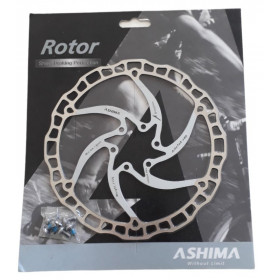 New product -47%180 disc brake 6 holes Ashima ARO 08 white
New product -47%180 disc brake 6 holes Ashima ARO 08 white- €15.37
- €29.00
-
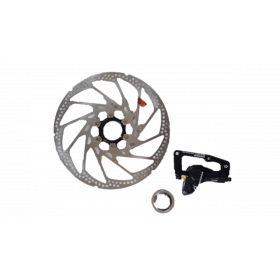 New productDisc brake and front brake caliper Shimano Hone
New productDisc brake and front brake caliper Shimano Hone- €43.99
-
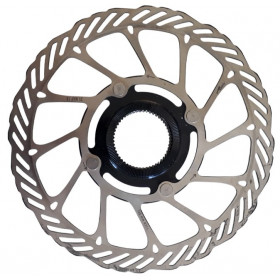 UsedAvid 160 disk brake centerlock
UsedAvid 160 disk brake centerlock- €12.99
-
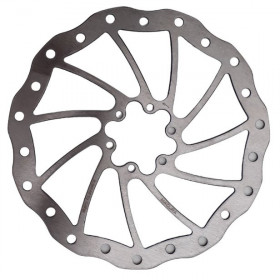 New productMagura disc brake 180 mm 6 holes
New productMagura disc brake 180 mm 6 holes- €14.99
-
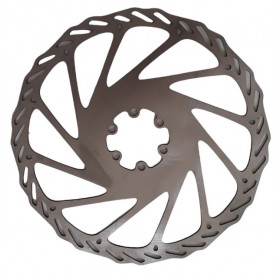 New product -37%Avid 203 mm disc brake 6 holes
New product -37%Avid 203 mm disc brake 6 holes- €39.05
- €61.99
-
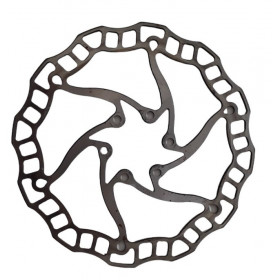 UsedAshima Airotor disc brake 160 mm
UsedAshima Airotor disc brake 160 mm- €7.99
-
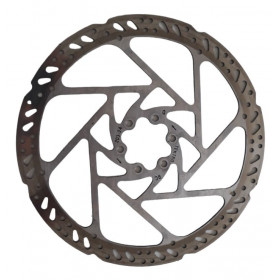 Used203 mm MTB disc brake 6 holes Tektro
Used203 mm MTB disc brake 6 holes Tektro- €8.99
-
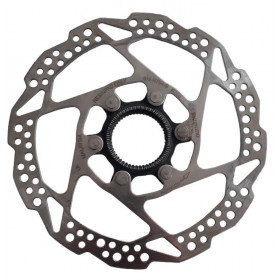 UsedShimano deore disc brake SM-RT54-S 160mm center lock
UsedShimano deore disc brake SM-RT54-S 160mm center lock- €4.99
-
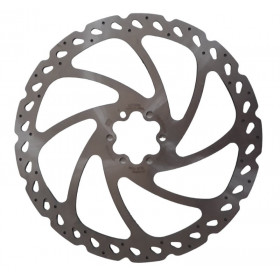 New productDisc brake 6 holes 203 mm
New productDisc brake 6 holes 203 mm- €18.99
-
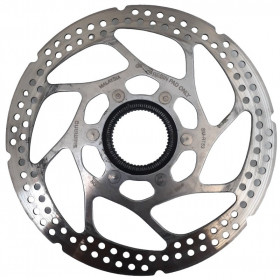 UsedShimano SM-RT53 disc brake 160 mm center lock used
UsedShimano SM-RT53 disc brake 160 mm center lock used- €7.99
-
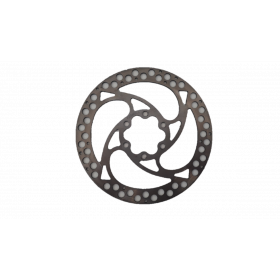 UsedFormula brake disc 140 mm 6 holes
UsedFormula brake disc 140 mm 6 holes- €8.99
-
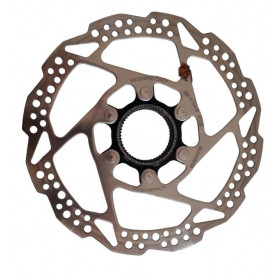 UsedShimano SM-RT54-S disc brake center lock 160 mm
UsedShimano SM-RT54-S disc brake center lock 160 mm- €4.99
-
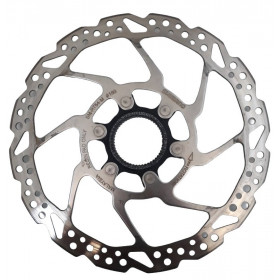 UsedShimano deore disc brake SM-RT54 180mm center lock
UsedShimano deore disc brake SM-RT54 180mm center lock- €5.99
-
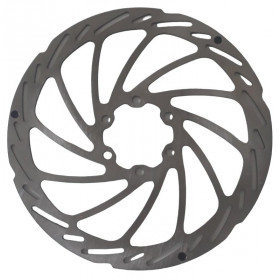 New product -30%BBB Powerstop disc brake 160 mm
New product -30%BBB Powerstop disc brake 160 mm- €15.37
- €21.95
-
 More detailsUsed Out-of-StockShimano SM-RT56-M 180mm 6-hole MTB disc
More detailsUsed Out-of-StockShimano SM-RT56-M 180mm 6-hole MTB disc- €5.99
Showing 1-20 of 20 item(s)
A MTB brake disc is an essential component to guarantee efficient, safe braking adapted to each type of practice. Their design varies depending on power requirements, heat dissipation and durability. Here is a detailed guide to the types, features and brands of MTB xc brake discs.
1. Types of MTB brake disc
a. Fixed disks
Description: One-piece discs, entirely made of steel.
Benefits :
Simple, affordable and robust.Little sensitive to vibrations (less noise).
Disadvantages:
Less efficient heat dissipation.Risk of deformation under high heat.
b. Floating discs
Description: Consist of two parts: a steel brake track and an aluminum center, connected by rivets.Benefits :
Better heat dissipation thanks to the aluminum center.Reduction of risks of deformation under stress.
Lightness.
Disadvantages: higher cost.
c. Ventilated discs
Description: Incorporate special fins or structures to improve air circulation.Benefits :
Optimal heat dissipation, ideal for long descents or e-bikes.Disadvantages: high price and extra weight.
d. Coated discs
Description: Discs with specific surface treatment (ceramic coating, anti-rust, etc.).Benefits :
Extended lifespan.Better performance under certain climatic conditions.
Disadvantages: often higher price.
2. Technical characteristics of a MTB brake disc:
a. Disc diameter
Common sizes are:
140 mm: For light cross-country or gravel.
160 mm: Versatile use (XC, trail).
180 mm: More power for trail, enduro and e-bikes.
200-203 mm: Ideal for enduro and downhill.
Choice according to the weight of the cyclist and the terrain:
The larger the diameter, the greater the braking power.
b. Compatibility with pads
The discs must be compatible with the pads (organic or metallic).
Discs designed for metal pads are more resistant to heat and wear.
Some discs are optimized for a specific type of pads.
c. Weight
Aluminum discs or discs with a floating center are generally lighter, suitable for practices such as XC.All-steel discs are heavier but sturdy, ideal for enduro or downhill riding.
d. Thermal resistance
Technologies like Ice-Tech (Shimano) or ventilated fins (Magura) improve heat management on long descents.e. Fixing
6 holes: Most common standard, compatible with the majority of hubs.Center Lock: Shimano patented system, easier to install, but requiring specific hubs.
3. Popular brands of MTB brake disc:
a. Shimano
RT-MT800 Ice-Tech:
Floating disc with advanced cooling technology.Available in 160, 180 and 203 mm.
Excellent heat management for enduro and long descents.
RT-66:
Affordable all-steel disc for versatile practices.b. SRAM
Centerline:
Optimized design to reduce vibration and noise.Available in standard version or with fins.
HS2:
Disc designed for e-bikes and demanding descents.Thick for greater rigidity and better heat dissipation.
c. Magura
Storm HC:
Robust and high-performance disc, ideal for enduro and downhill.Available in 180 and 203 mm.
MDR-C:
Designed for e-bikes with excellent heat management.d. Hope
Floating Rotor:
Customizable floating disc with different colored centers.
Very popular for high end bikes.
e. TRP
TRP R1:
Lightweight and efficient, often used in cross-country and trail running.
Good modulation and power.
f. Galfer
Disc Wave:
Unique wavy disc design, improving heat dissipation.
Known for his competitive performances.
g. Formula
Formula Cura: versatile discs offering excellent stopping power.
4. Tips for choosing a MTB brake disc:
Identify your practice:
Cross-country: Lightweight discs from 140 to 160 mm.Trail/Enduro: Robust discs of 180 mm or more.
Descent: Ventilated or floating discs from 200 to 203 mm.
Consider your weight and riding style:
A larger disc is recommended for heavy riders or those going downhill at high speeds.Check compatibility:
Make sure your rotors are compatible with your hubs (6-hole or Center Lock) and your braking system.Regular maintenance:
Clean your records after each ride to prevent dirt buildup.Replace them as soon as they show signs of wear or cracks.
In summary
The choice of MTB brake disc depends on your practice, your equipment and your expectations in terms of performance. Brands like Shimano, SRAM, Magura, and Hope offer models suitable for all terrains and levels of practice. Opting for a quality disc guarantees better braking power, optimal modulation and increased safety on the trails.
